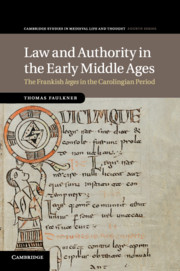Book contents
- Frontmatter
- Contents
- List of illustrations
- List of tables
- Abbreviations
- INTRODUCTION
- 1 THE MINOR leges PART I. PROBLEMS, BACKGROUND, Lex Ribuaria, Ewa ad Amorem
- 2 THE MINOR leges 2. SAXONY AND THE Lex Saxonum
- 3 THE ADDITIONAL CAPITULARIES
- 4 THE READING OF NORMATIVE TEXTS: BENEDICTUS LEVITA AND REGINO
- 5 THE MANUSCRIPTS OF THE leges-SCRIPTORIUM
- CONCLUSION
- Editions
- Bibliography
- General index
- Index of legal texts
- Index of manuscripts
2 - THE MINOR leges 2. SAXONY AND THE Lex Saxonum
Published online by Cambridge University Press: 05 February 2016
- Frontmatter
- Contents
- List of illustrations
- List of tables
- Abbreviations
- INTRODUCTION
- 1 THE MINOR leges PART I. PROBLEMS, BACKGROUND, Lex Ribuaria, Ewa ad Amorem
- 2 THE MINOR leges 2. SAXONY AND THE Lex Saxonum
- 3 THE ADDITIONAL CAPITULARIES
- 4 THE READING OF NORMATIVE TEXTS: BENEDICTUS LEVITA AND REGINO
- 5 THE MANUSCRIPTS OF THE leges-SCRIPTORIUM
- CONCLUSION
- Editions
- Bibliography
- General index
- Index of legal texts
- Index of manuscripts
Summary
INTRODUCTION
The sources for Saxony allow us to observe lex from a completely different angle. They are unusually rich in references to lex, and often in contexts that tie it specifically to the Saxon gens. Lex clearly mattered to the Saxons, and to those wishing to write about Saxony, throughout the ninth century.
Very little positive information is known about the inhabitants of Saxony before the Carolingian conquest. We know only that they had no writing, no coin, probably had no centralised political organisation, and were not Christian. But by the earlier tenth century the Saxons were sprouting the most powerful kings in Europe as the Carolingian political order was transformed. The ninth century was, then, a period of extraordinary social, political, and cultural change in Saxony. New forms of political organisation were established, writing and coin introduced, a new religion and network of churches and monasteries established, and an independent Saxon political identity developed. I trace the role of lex in these processes of change in two kinds of source: narratives, including hagiographies, then various records of disputes and settlements. I shall then relate these observations to an analysis of the legal texts.
If we take our references as signifying written lex, the degree of interest found in Saxon texts and texts concerning Saxony is surprising. Throughout the ninth century the Saxon church remained poor by comparison with the Frankish heartlands, royal lands were restricted in scope, and even royal visits were very infrequent. Under Louis the German, it has been argued that Saxony was ruled far less ‘intensively’ than Franconia. However we think of this difference, in quantitative or qualitative terms, it is clear that Saxony had a different relationship with royal power from that elsewhere in the Frankish kingdoms in the ninth century, and part of this may be connected with a reluctance of East Frankish kings to issue laws of any kind. We have capitularies from Charles the Bald, from the Lothars, but nothing from Louis the German. Tenth-century Ottonian government in Saxony at least in certain senses went on to place less emphasis on written instruments than Carolingian, and just one text that looks like a capitulary survives from the tenth century, from 951.
- Type
- Chapter
- Information
- Law and Authority in the Early Middle AgesThe Frankish leges in the Carolingian Period, pp. 46 - 83Publisher: Cambridge University PressPrint publication year: 2016



